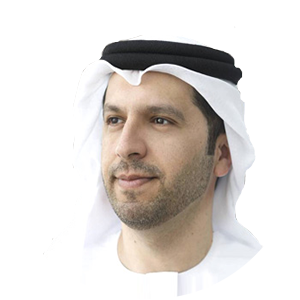Dr. Arif Sultan Al-Hammadi
Executive Vice President,
Khalifa University
 1.
1. 2.
2. 3.
3.Executive Vice President,
Khalifa University
National University of Singapore
Robotics science and technology have evolved from the seminal applications in industrial robotics for manufacturing to today’s varied applications in service, health care, education, entertainment and other industries including construction, mining and agriculture. One common theme in these emerging applications is the human-centered nature, where robotic systems surround humans, aiding and working with us to enrich and enhance the quality of our lives. The boundaries of what defines a robotic system continue to expand and at the same time become fuzzier as robotic systems become part of our everyday lives, signaling the start of a robotics revolution that would have more impact than the industrial and IT revolutions. This talk reviews the state-of-the-art developments in fundamental capabilities as well as emerging applications. This talk will then conclude with the challenges in science and technology to further accelerate the robotics revolution.
Dr. Marcelo H. Ang, Jr. received his BSc and MSc degrees in Mechanical Engineering from the De La Salle University in the Philippines and University of Hawaii, USA in 1981 and 1985, respectively, and his PhD in Electrical Engineering from the University of Rochester, New York in 1988 where he was an Assistant Professor of Electrical Engineering. In 1989, he joined the Department of Mechanical Engineering of the National University of Singapore where he is currently an Associate Professor and Acting Director of the Advanced Robotics Center. His research interests span the areas of robotics, mechatronics, autonomous systems, and applications of intelligent systems. He teaches robotics; creativity and innovation; applied electronics and instrumentation; computing; design and related areas. In addition to academic and research activities. He is also actively involved in the Singapore Robotic Games as its founding chairman, and the World Robot Olympiad as member of its Advisory Council.
Chair, Emirates Scientists Council. Science Lead,
Emirates Mars Mission (Hope Mission) and Director,
Space Science Department
The UAE has entered the space exploration race with the announcement of Emirates Mars Mission (EMM), the first Emirati mission to another planet, in 2014. Through this mission, UAE is to send an unmanned probe, called Hope probe, to be launched in summer 2020 and reach Mars by 2021 to coincide with UAE’s 50th anniversary. The mission should be unique, and should aim for novel and significant discoveries that contributed to the ongoing work of the global space science community. The mission is designed to answer the following three science questions:
Dr. Marcelo H. Ang, Jr. received his BSc and MSc degrees in Mechanical Engineering from the De La Salle University in the Philippines and University of Hawaii, USA in 1981 and 1985, respectively, and his PhD in Electrical Engineering from the University of Rochester, New York in 1988 where he was an Assistant Professor of Electrical Engineering. In 1989, he joined the Department of Mechanical Engineering of the National University of Singapore where he is currently an Associate Professor and Acting Director of the Advanced Robotics Center. His research interests span the areas of robotics, mechatronics, autonomous systems, and applications of intelligent systems. He teaches robotics; creativity and innovation; applied electronics and instrumentation; computing; design and related areas. In addition to academic and research activities. He is also actively involved in the Singapore Robotic Games as its founding chairman, and the World Robot Olympiad as member of its Advisory Council.